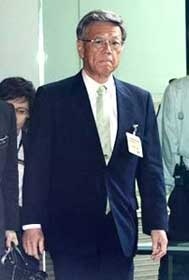Onaga asks, “Do you not think that under the U.S.-Japan Status of Forces Agreement, Japan’s independence is a myth?”

Governor Onaga enters Kantei at about 10:35 a.m. on May 23 to make an appeal to Prime Minister Abe related to the recent incident of an Okinawan woman’s body being dumped by a US military employee.
May 24, 2016 Ryukyu Shimpo
On the morning of May 23, Governor Takeshi Onaga of Okinawa went to Tokyo to visit Kantei (the official residence of the Prime Minister) in order to make an appeal related to, and to protest, the recent discovery of Okinawan woman’s corpse that had been abandoned by a military base employee. With his lips pursed and wearing a grim expression, Governor Onaga faced Prime Minister Abe Shinzo and Chief Cabinet Secretary Yoshihide Suga. The politicians did not shake hands in greeting, and even during the one minute when the press usually take pictures and listen to the conference members exchanging greetings, the full minute passed without a word being spoken from either side. Onaga stared straight ahead, not even looking at the other two politicians.
During the conference, Onaga asks, “Do you not think that under the U.S.-Japan Status of Forces Agreement, Japan’s independence is a myth?” On that day, Onaga was composed from start to finish as he answered reporters’ questions, but he was firm in his request for concrete results from the Japanese government in revising the U.S.-Japan SOFA, getting a conference between himself and President Obama, and establishing preventative measures against incidents involving the U.S. military in Okinawa. Despite his weighty emotions, tears only welled up in Onaga’s eyes when the Japanese government showed no sign of setting up means to prevent recurrence of incidents like the one involving the military employee.
At the meeting of the Cabinet Office’s Okinawa Development and Promotion Council that opened after Onaga’s request, the members held a moment of silence for the recent incident. One member shared thought about the direction of Okinawa development and promotion from this point, that “Women are unmistakably vulnerable to sex crime,” and asked, “Is it not important for the government and people to deal with this issue as one?” The impact and shock of the incident is spreading, and leaving an impression on many levels.
After the Council meeting, Onaga mentioned the special treatment military employees get under the U.S.-Japan SOFA. He said that military personnel and employees often look at Okinawan citizens as though Okinawa is still under U.S. occupation. With these statements, Onaga is trying to get the Japanese and the US governments to revise the SOFA.
(English translation by T&CT and Erin Jones)
Previous Article:In wake of murder, Governor Onaga requests meeting with President Obama
Next Article:Protest rallies against US military over death of Okinawan woman continue
[Similar Articles]
- Okinawa City Council passes protest resolution over hit-and-run
- In wake of murder, Governor Onaga requests meeting with President Obama
- Obama not apologizing for alleged murder of Okinawan woman by ex-marine
- “Would you build it in Lake Towada, Matsushima, or Lake Biwa?” Governor Takeshi Onaga says base relocation “For political purposes,” urges Diet committee to reconsider
- Okinawa Governor urges Defense Minister to respect right to self-determination regarding new US base
 Webcam(Kokusai Street)
Webcam(Kokusai Street)


